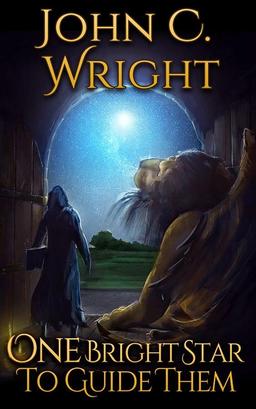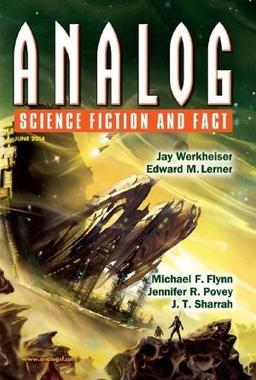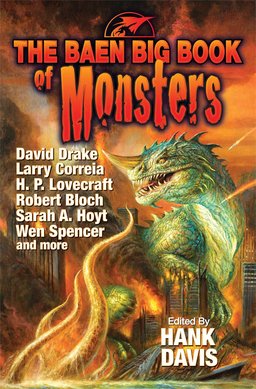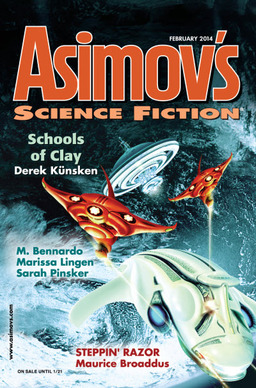The 2015 Hugo Shortlist, Short Fiction: A Review
 I promised to read all the short fiction Hugo nominees, and report on them, so here you go.
I promised to read all the short fiction Hugo nominees, and report on them, so here you go.
I’ll begin by mentioning that I haven’t come close to reading the novel nominees: I have only read Ancillary Sword, by my almost-neighbor Ann Leckie, and while I quite enjoyed it I thought it not as good as Ancillary Justice. A middle-book thing, in some ways – in other ways, I think this post by lightreads gets at some of the problems I had pretty well.
I’m also about halfway through The Three-Body Problem, by Cixin Liu –- I’m not sure what to think yet. There’s some neat ideas, but some of them seem distinctly pulpy, and the writing is a bit dodgy. We’ll see how it works out in the end.
Novellas
So, to the novellas. The final list of nominees is:
Big Boys Don’t Cry, Tom Kratman
“Flow,” Arlan Andrews, Sr.
One Bright Star to Guide Them, John C. Wright
“Pale Realms of Shade,” John C. Wright
“The Plural of Helen of Troy,” John C. Wright
My own nominees were:
“Grand Jete (the Great Leap),” by Rachel Swirsky (a Nebula nominee)
“The Things We Do For Love,” by K. J. Parker
The Witch in the Almond Tree, by C. S. E. Cooney
Dream Houses, by Genevieve Valentine
Sleep Donation, by Karen Russell
 My rankings of the Hugo shortlist, plus comments:
My rankings of the Hugo shortlist, plus comments:
- One Bright Star to Guide Them – This is a pretty good story, an expansion of an F&SF short story I had quite enjoyed some years ago. It’s fairly explicitly – perhaps too much so – a take on Narnia, even to the point of having a guide in the form of a cat be killed and then resurrected. It’s also a look at what happens when children who had adventures in a fantasy world are summoned again as adults – a notion that’s been done before as well, in for example the Narnia books themselves. I think Wright loses his way just a bit at the end, but all in all a fine story, not one I’d have nominated for a Hugo myself but not a story that, absent all the externalities affecting the Hugos this year, would have surprised me as a nominee.
- “Flow” – One of a series of stories set in what seems to be a future Ice Age. These have been pretty fun over all, and this is probably the best of them. That said, it’s just decent, not great, and it doesn’t come to a proper ending, which is true of a couple of the nominated novelettes as well. It’s about a young man who travels south with a group guiding an iceberg to the warmer lands. In the way of things, he begins to learn some secrets about his world… and he also encounters the rather oppressive society of the city he visits, finally being forced to make a daring escape… slingshotting us to the next episode…
- “The Plural of Helen of Troy” – This is set in Metachronopolis, a city made of solidified time energy, in which people plucked out of history live, and in which numerous different versions of history intersect. This story in particular is about a man hired by an immediately recognizable historical figure to save the woman he loves (who is supposed to be a version of Helen of Troy, and who is also immediately recognizable as a historical figure famously involved with the other historical figure) from a nasty older rapist. There’s a lot of expectedly confusing fooling around with time paradoxes… in the end I don’t think it works, but there are some interesting ideas.
- “Pale Realms of Shade” – Here a dead man – a ghost – is haunting his wife, who wants him to tell her that he was murdered. Naturally, another man is involved … and in the end what’s really important is what the ghost learns about himself. Again, some OK ideas – in this case not coalescing into a story that really involved me.
- Big Boys Don’t Cry – This piece concerns an AI tank, named Maggie. We open with her final battle, against the alien Slugs, and then, as her remains are taken away for salvage, she recalls a number of her previous battles, involving lots of heroism … but also lots of betrayal. The story (on purpose I think) presents itself initially as a rather jingoistic piece of military SF, but pivots to present a distinctly anti-war message, or at least anti the way those who fight the wars are manipulated and betrayed. The problem with this story is first, that’s it’s not much of a story, and second, that it’s quite poorly written. In my view, definitely not worthy of a Hugo nomination.
Novelettes
The nominees:
“Ashes to Ashes, Dust to Dust, Earth to Alluvium,” Gray Rinehart
“Championship B’tok,” Edward M. Lerner
“The Day the World Turned Upside Down,” Thomas Olde Heuvelt, Lia Belt translator
“The Journeyman: In the Stone House,” Michael F. Flynn
“The Triple Sun: A Golden Age Tale,” Rajnar Vajra
And my own nominations:
“Schools of Clay,” by Derek Künsken
“A Guide to the Fruits of Hawai’i,” by Alaya Dawn Johnson (which just won the Nebula)
“I Can See Right Through You,” by Kelly Link
“Collateral,” by Peter Watts
“Petard,” by Cory Doctorow

And my ranking:
- “The Journeyman: In the Stone House” – Like the Andrews novella and the Lerner novelette, this is part of a “stealth serialization” in Analog, and like those two, doesn’t really come to a proper end. I’ve quite enjoyed the whole series, which is set in Flynn’s Spiral Arm future, on a world which has forgotten it is an Earth colony. The main characters, who are traveling around their world, in this episode end up getting shanghaied into a sort of Foreign Legion.
- “Championship B’tok” – part of a long series of stories rooted in an “Interstellar Net,” originally based on the notion that information is the most useful commodity to travel between the stars, leading to a sort of internet between Earth and several intelligent races. These have included some pretty good stories, with some nice Sfnal speculation. By now, physical interstellar travel is a reality, and aliens called the Snakes, in a previous episode, tried to invade the Solar System and have been isolated on an outer system moon. In this story the warden of this moon, Carl Rowland, is confronted with some mysterious “industrial accidents” among the Snakes, while also reflecting on his haltingly improving ability at the snake game B’Tok … clearly something is going on, and the story works its way to the point of revelation … and stops. Wait for sequel. It’s not bad … I enjoyed reading it, and I want to know what happens next. But it’s not really a complete story.
- “The Triple Sun: A Golden Age Tale” – This one is pretty silly, but I cut it a bit of slack because I suspect that was partially intended. It opens with a Martian, a Venusian, and an Earthwoman going into a bar… and makes the predictable “joke” that it’s not a joke – they’re space cadets, and they get in trouble, and so of course they are sent on a critical rescue mission to an alien planet, as “punishment” (for the people they are rescuing, one wonders?) There are a few cute ideas here, and the story bounces along nicely enough, but it just doesn’t make sense, and I would have hoped that even if you kind of liked the story – as you well might – you’d see that it wasn’t Hugo material.
- “The Day the World Turned Upside Down” – I rather liked Thomas Olde Heuvet’s Hugo nominee from last year, “The Ink Readers of Doi Saket” – not enough that I’d have given it a Hugo, but enough that I wasn’t all that surprised it was nominated. This piece, published at Lightspeed, for which I am very proud to be Reprint Editor, is OK, certainly evidence of a talented writer, but it’s not as good as “Doi Saket.” It’s fantastical premise – gravity literally shifts 180 degrees – is purely metaphorical, used in service of the main character’s despair over the end of a relationship. There’s nothing wrong with that as a literary device, but it has to be really special to wow me, and this story is merely – and admirably enough! – pretty good.
- “Ashes to Ashes, Dust to Dust, Earth to Alluvium” – Grey Rinehart, I’ll note, has been publishing pretty enjoyable work, often in Analog, for quite a while now. It’s nice enough to see him get a bit of recognition, but, as with so many stories on this nomination list, this really is not him at his best. It is ambitious, like a number of stories here – by and large, the slate selections tend to reward ambition, but not necessarily successful achievement of that ambition. This story is about a dying man from a human colony on an alien-controlled planet, arranging for a memorial to his death in a way that will provoke the alien mores. All in all, an idea with promise, but not one that I could believe, step by step.
Short Stories
The nominees:
“On a Spiritual Plain,” by Lou Antonelli
“The Parliament of Beasts and Birds,” by John C. Wright
“A Single Samurai,” by Steven Diamond
“Totaled,” by Kary English
“Turncoat,” by Steve Rzasa
And my nominees, seven deep because I really couldn’t decide:
“Sadness,” by Timons Esaias
“The Manor of Lost Time,” by Richard Parks
“Aberration,” by Genevieve Valentine
“Cimmeria: From the Journal of Imaginary Anthropology,” by Theodora Goss
“The Hand is Quicker,” by Elizabeth Bear
“Mothers! Lock Up Your Daughters, Because They Are Terrifying,” by Alice Sola Kim
“Fift and Shria,” by Benjamin Rosenbaum

My ranking of the actual nominees:
- “ A Single Samurai” – This story has a rather nice basic premise, a lone samurai scaling a mountain-sized monster to try to kill it and save his people. There’s not a whole lot here beyond the premise, but it is nicely enough done.
- “Totaled” – Kary English takes on a familiar enough idea, in a story that I would categorize as evidence that she’s a talented writer worth watching, but by no means a finished product, and not yet Hugo ready. This is about a woman, a researcher into uploading people into computers, who has died in an accident and “wakes up” in a computer. Nicely enough done, with a somewhat affecting story about her realization of what’s going on in the “real world” with those who have lost her… but not special.
- “On a Spiritual Plain” – Lou Antonelli has published a number of pretty fine stories in the last decade or so, and his Letters From Gardner, nominated for Best Associated Book (it’s a story collection interspersed with descriptions of the writing process for the stories, the submission process, and the advice Gardner Dozois offered in his rejection letters), is a nice piece of work, and a reasonable Hugo nominee. “On a Spiritual Plain” isn’t as good, alas – it’s another story of some ambition, and another story on a religious subject (one of at least four on the short fiction ballots), but it just doesn’t have that zing for me. It’s about a man on an alien planet where the aliens believe that souls are actual physical (or electromagnetic) entities, and his mission to give one of the humans on the world rest after his death. The problem is that first, the basic idea isn’t exactly new, and isn’t that interesting, and more importantly, the story wrapped around it just doesn’t ever surprise or illuminate.
- “The Parliament of Beasts and Birds” – This is pure Catholic allegory, about talking beasts (and birds) after the demise of Man. There’s no story, just some philosophizing, and some high-flown rhetoric which to my taste represents Wright’s prose going somewhat overboard. More importantly, there’s no story! (I thought if the Puppies were about anything it was about the importance of storytelling!)
- “Turncoat” – Finally, this is just a bad story. I honestly don’t see why anyone would nominate this very weak effort for any award. It’s about an AI spaceship fighting a war which realizes it’s on the wrong side, so switches. The writing is dreadful, and the story is lame.
Having gone through the entire list, I’m annoyed again. The problem is, simply, that very few really good stories got nominated. I really want the Hugos to celebrate greatness, or at least “very-goodness.”
 Undoubtedly many past Hugos come short of that, but at least they try. There are plenty of stories that, in my opinion, fit the parameters the Sad Puppies seem to want: bedrock Sfnal themes, solid and intriguing plots, lack of preaching, lack of emphasis on good writing at the expense of “story values”… I might not sign up for all those things, but I can sure understand the desire for them – but why not nominate more stories that really qualify?
Undoubtedly many past Hugos come short of that, but at least they try. There are plenty of stories that, in my opinion, fit the parameters the Sad Puppies seem to want: bedrock Sfnal themes, solid and intriguing plots, lack of preaching, lack of emphasis on good writing at the expense of “story values”… I might not sign up for all those things, but I can sure understand the desire for them – but why not nominate more stories that really qualify?
I mean, it’s not like they don’t exist – for example, there was this recent Hugo-winning novel… I didn’t like it all that much, but it definitely had a strong plot, and solid Sfnal thematic material, and thought it was well-enough written no one would cite it as an example of exquisite prose… it was called Redshirts. Don’t you think that would be a standard-bearer for the Sad Puppies movement?
Granted that my taste isn’t everyone’s, I still find it very hard to look at the my nomination lists above and not think that they are far better than the final Hugo shortlists. I don’t doubt others can put forward lists that diverge entirely from mine, and that I can look at and say, well, those aren’t my choices but I can see why they were chosen. Problem is, with only perhaps three exceptions, I can’t see any of the stories on the actual final Hugo ballot plausibly showing up on any of those hypothetical alternate lists.
To me, it’s particularly distressing to see such worthy – and tremendously original, and strongly Science-Fictional – stories as “Schools of Clay,” “Sadness,” and “The Hand is Quicker –” get ignored. (I’m not happy the great fantasies get missed, either, but I get it, for some people the Hugo is supposed to be for Science Fiction, capital letters and all, and I may disagree but I won’t argue if that’s your view.)
Rich Horton’s last Hugo article for us was A Modest Proposal to Improve the Hugos. See all of Rich’s retro-reviews here.
I matched and mixed some of your picks. “One Star to Guide Them”, “Big Boys Don’t Cry”, and then “Flow” in that order with, “Championship B’Tok”, “Triple Sun”, were my picks but I thought the day the world turned upside down was awful. Perhaps it was the translation, I don’t know. “A Single Samurai” was my pick. I’m vacationing so I won’t be able to respond much.
I did select Vox Day for his bit on Ride A Red Horse. I spent years in the military and the anthology on 4th Gen warfare was heinous work. I’m having trouble with the novels too. I not feeling it for Three Body Solution, again, it could be a translation thing. I agree about Ancillary. I like her other stuff but just not this series.
I think you gave it all justice. I didn’t read any anti Puppy sentiment. I don’t have a problem with anyone who picks what they like. I’m a little numb to anti Puppy barbs thrown my way. If anyone wants to hate me because I like Conan, Heinlein, or whatever go for it. Another good post sir!
[…] Rather than making their point by nominating white male authors that actually were putting out good work, the Sad Puppies got hijacked themselves by the much more culturally insane Rabid Puppies, led by internet provocateur Vox Dey. Because enough Sad Puppies became Rabid in the nomination process, even science fiction editors with no dog in the fight noted that the Puppies nominees were simply not good. Here’s editor Rich Horton on this year’s Hugo short story nominations: […]
[…] Rather than making their point by nominating white male authors that actually were putting out good work, the Sad Puppies got hijacked themselves by the much more culturally insane Rabid Puppies, led by internet provocateur Vox Dey. Because enough Sad Puppies became Rabid in the nomination process, even science fiction editors with no dog in the fight noted that the Puppies nominees were simply not good. Here’s editor Rich Horton on this year’s Hugo short story nominations: […]
[…] Rather than making their point by nominating white male authors that actually were putting out good work, the Sad Puppies got hijacked themselves by the much more culturally insane Rabid Puppies, led by internet provocateur Vox Dey. Because enough Sad Puppies became Rabid in the nomination process, even science fiction editors with no dog in the fight noted that the Puppies nominees were simply not good. Here’s editor Rich Horton on this year’s Hugo short story nominations: […]
[…] Rather than making their point by nominating white male authors that actually were putting out good work, the Sad Puppies got hijacked themselves by the much more culturally insane Rabid Puppies, led by internet provocateur Vox Dey. Because enough Sad Puppies became Rabid in the nomination process, even science fiction editors with no dog in the fight noted that the Puppies nominees were simply not good. Here’s editor Rich Horton on this year’s Hugo short story nominations: […]
[…] https://www.blackgate.com/2015/07/09/the-2015-hugo-shortlist-short-fiction-a-review/ […]
[…] https://www.blackgate.com/2015/07/09/the-2015-hugo-shortlist-short-fiction-a-review/ […]